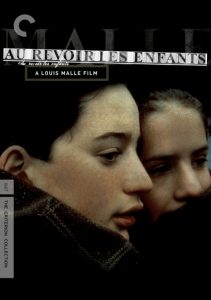Au Revoir Les Enfants-1987
Director Louis Malle
Starring Gaspard Manesse, Raphael Fejto
Scott’s Review #859
Reviewed January 21, 2019
Grade: A
Au Revoir Les Enfants (1987), the English translation Goodbye, Children is a powerful story of youth and friendship amid a French boarding school during the Nazi occupation of France.
As World War II rages on Director Louis Malle crafts a tragic and poignant film that resonates on many levels featuring both good and evil and the forever loss of childhood innocence.
The film is based on actual events that Malle experienced as a child when he attended a Roman Catholic boarding school. At age eleven he witnessed a Gestapo raid in which three Jewish children and a Jewish teacher were savagely rounded up and taken to Auschwitz concentration camps and presumably to their deaths.
What a powerful and tragic event he faced, and he brilliantly transplants this into his film.
We meet young Julien Quentin (Gaspard Manesse) as he bids his mother farewell and takes a train to his boarding school after a lengthy vacation. The headmaster introduces three new students one of which is Julien’s age. Jean Bonnet (Raphael Fejto) is socially awkward but excels at mathematics and piano.
The boys initially dislike one another but slowly forge a powerful bond when they are immersed in playing a game of treasure hunt together. Julien soon discovers that Bonnet is Jewish, and the school is protecting him from capture.
The film is divided into two main stories, the troubled relationship and subsequent friendship between Julien and Bonnet, the revelation that Bonnet is Jewish, and the benevolence of the school officials to the plight of Jews.
The latter gives Au Revoir Les Enfantes a socially relevant angle as the audience begins to care deeply about Bonnet and the other Jewish boys yearning for education and freedom.
Their innocence and confusion over being hated are effective and painful to watch.
The tyranny of the Gestapo is matched by the kindness and courage of the teachers who defy the anti-Semitic policies and admit Jewish students into the school under assumed names.
The teachers are the heroes of the story and largely unsung as they yearn to give children of any religion a good education and a chance at happiness and fulfillment.
I would love to see schools feature Au Revoir Les Enfantes to their students as a lesson in bravery.
Any viewer who has visited France will assimilate nicely with the good culture and sophistication of the country envelopes. Most scenes occur at the boarding school with lessons being learned and the growth of many of the students, but a favorite scene takes place at a gourmet restaurant.
As Julien and his mother lunch with Bonnet and others the meals, staff, and ambiance exude French style and goodness, but among these luxuries also lies the constant threat of the Nazis as they bombard the restaurant and attempt to kick a Jewish man out of the establishment.
Malle wisely affixes the camera closely on the faces of Manesse and Fejto with a glowing quality that is both beautiful and haunting. This results in many scenes featuring the expressions of the boys including wonderment, shock, intensity, and fear.
The young actors rise to the occasion and perform their roles flawlessly with a natural quality.
The boys learn a myriad of valuable lessons most notably that the world is unjust and filled with unfairness. Malle gives the finale more than enough power and angst to leave the viewer pondering the fates of the Jewish characters.
Their fates are undoubtedly sealed by the Nazis the hows and the whys are left ambiguous eliciting powerful emotions.
Au Revoir Les Enfantes (1987) is a superb and relevant offering depicting the pain and fear experienced by Jewish people in a tragic period of history. Told through the eyes of children the film hits home as innocence is discovered and then lost.
The film was nominated for the Best Foreign Language Film Oscar but was defeated by Babette’s Feast.
Oscar Nominations: Best Screenplay Written Directly for the Screen, Best Foreign Language Film
Independent Spirit Award Nominations: Best International Film
